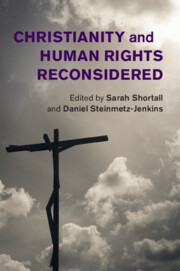Book contents
- Christianity and Human Rights Reconsidered
- Human Rights in History
- Christianity and Human Rights Reconsidered
- Copyright page
- Contents
- Figures
- Contributors
- Preface
- Acknowledgments
- Introduction
- Part I General Reflections
- Part II European Catholicism and Human Rights
- Part III American Protestant Trajectories
- 7 William Ernest Hocking and the Liberal Protestant Origins of Human Rights
- 8 Inside the Cauldron
- 9 The Dignity of Paul Robeson
- Part IV Beyond Europe and North America
- Index
8 - Inside the Cauldron
Rawls and the Stirrings of Personalism at Wartime Princeton
from Part III - American Protestant Trajectories
Published online by Cambridge University Press: 26 September 2020
- Christianity and Human Rights Reconsidered
- Human Rights in History
- Christianity and Human Rights Reconsidered
- Copyright page
- Contents
- Figures
- Contributors
- Preface
- Acknowledgments
- Introduction
- Part I General Reflections
- Part II European Catholicism and Human Rights
- Part III American Protestant Trajectories
- 7 William Ernest Hocking and the Liberal Protestant Origins of Human Rights
- 8 Inside the Cauldron
- 9 The Dignity of Paul Robeson
- Part IV Beyond Europe and North America
- Index
Summary
This chapter traces the intellectual trajectory of the young John Rawls to show how several strands of Christian personalist theology intertwined at Princeton during the Second World War. It highlights a major new archival discovery: the undergraduate Rawls’s first published essay, a piece that demonstrates his early exposure to the ideas of Catholic philosopher Jacques Maritain. By considering in turn the influences on Rawls of American Episcopal Protestantism, Catholic human rights discourse, and continental dialectical theology, this chapter seeks to challenge historiographies that treat those different strands of Christian personalism in isolation. It also emphasizes the fundamentally liberal orientation of many Christian personalists, specifically their preoccupation with defending human free will as both essential to personhood and compatible with a robust theology of grace. This chapter draws attention to an oft-neglected liberal faction within the “Theological Discussion Group” of neoorthodox fame and showcases the enormous impact these liberal theologians had on reshaping elite American undergraduate religious education. This chapter ultimately argues that Rawls’s own liberalism, which would come to so define postwar political philosophy, was first forged in the cauldron of Christian personalism at Princeton and is best understood as a case for social revolution emerging from that framework.
Keywords
- Type
- Chapter
- Information
- Christianity and Human Rights Reconsidered , pp. 158 - 188Publisher: Cambridge University PressPrint publication year: 2020
- 1
- Cited by



